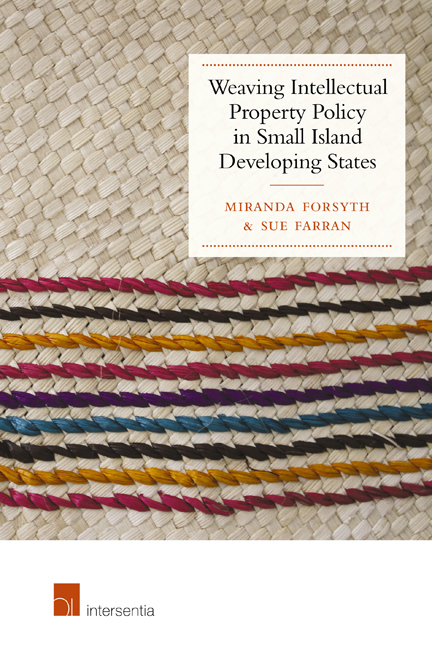Book contents
- Frontmatter
- Dedication
- Acknowledgements
- Contents
- List of Tables
- Introduction
- Chapter 1 Intellectual Property and Development: The Issues Viewed through a Pacific Islands Prism
- Chapter 2 Health and Issues of Access to Medicine
- Chapter 3 Access to Educational Resources
- Chapter 4 Problems with Importing the Global Intellectual Property Regime into Pacific Island Countries: Learning from Land
- Chapter 5 Setting Out a New Approach to Intellectual Property and Development
- Chapter 6 Intellectual Property and Technological Innovation in Pacific Island Countries: The Example of Sustainable Sea Transport
- Chapter 7 Branding, Certifying and Authenticating in Pacific Island Countries
- Chapter 8 The Regulation of Traditional Medicinal Knowledge in Pacific Island Countries
- Conclusion
- About the Authors
Chapter 4 - Problems with Importing the Global Intellectual Property Regime into Pacific Island Countries: Learning from Land
Published online by Cambridge University Press: 22 November 2017
- Frontmatter
- Dedication
- Acknowledgements
- Contents
- List of Tables
- Introduction
- Chapter 1 Intellectual Property and Development: The Issues Viewed through a Pacific Islands Prism
- Chapter 2 Health and Issues of Access to Medicine
- Chapter 3 Access to Educational Resources
- Chapter 4 Problems with Importing the Global Intellectual Property Regime into Pacific Island Countries: Learning from Land
- Chapter 5 Setting Out a New Approach to Intellectual Property and Development
- Chapter 6 Intellectual Property and Technological Innovation in Pacific Island Countries: The Example of Sustainable Sea Transport
- Chapter 7 Branding, Certifying and Authenticating in Pacific Island Countries
- Chapter 8 The Regulation of Traditional Medicinal Knowledge in Pacific Island Countries
- Conclusion
- About the Authors
Summary
INTRODUCTION
As has been indicated in Chapter 1, the influence of a western hegemony in a global trade context has resulted in the diffusion of models, concepts and legal frameworks informed by western, liberal, capitalist economic thinking. This diffusion, which has been achieved by the introduction of transplanted legal ideas and norms, has been facilitated by colonialism and post-colonial globalisation. The experience of Pacific island countries is marked by both of these characteristics. In the context of intellectual property an increasingly straight-jacketed and all-encompassing ‘one-size-fits-all’ approach has been adopted, and while there is room for limited manoeuvrability as we have indicated elsewhere in this book, small island developing states often lack the resources or expertise to make the most of these. It is also the case that Pacific island countries do not start with a clean sheet and the task of reviewing and reforming the laws that exist may, in itself, be a considerable task, particularly if a holistic approach is to be achieved. Also, as pointed out in the case of Vanuatu's accession to the World Trade Organisation discussed in the context of patents and access to medicine in Chapter 2, the consequences and impact of law reform can vary depending on the particularities of circumstances.
THE INTRODUCTION OF LAWS
As with other areas of law, prior to independence intellectual property laws were introduced primarily to safeguard the intellectual property interests of settlors and non-indigenous people. At independence these laws, along with other introduced laws, were retained under interim provisions found in the constitutions of these new states which maintained the laws in force unless these were contrary to the new status of the country or found to be incompatible with either the constitution or other national laws. At this stage little attention was given to whether the laws so retained were best suited to the needs of the newly independent countries. At the same time independence offered an opportunity to reassert the importance of customary law or customary values through integration into the formal legal system, usually the Constitution, to a greater or lesser extent. In fact, whether formally integrated or not, custom and customary values proved to be resilient during the colonial era, and have remained important and relevant to the daily lives of most Pacific islanders.
- Type
- Chapter
- Information
- Publisher: IntersentiaPrint publication year: 2015

